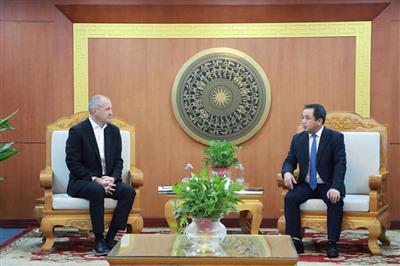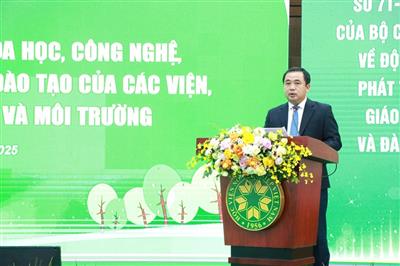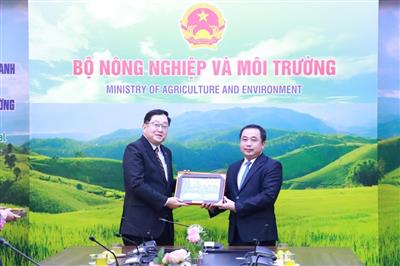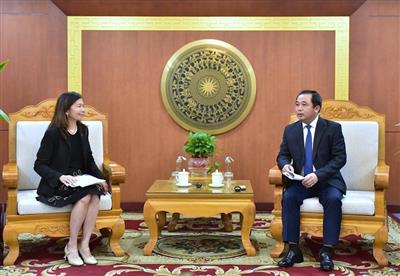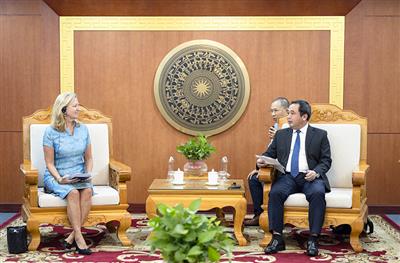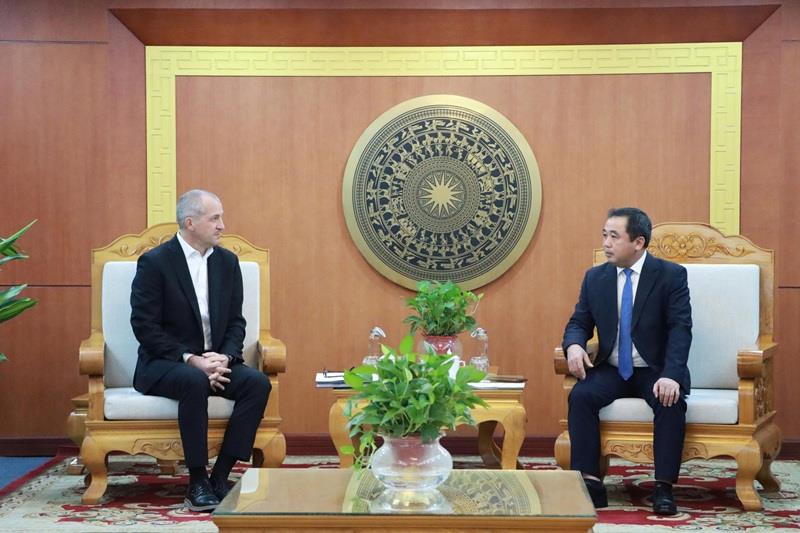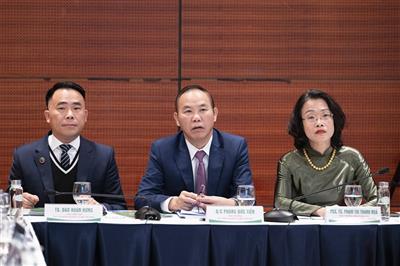
Vietnam - Japan Ocean Policy Dialogue 2025: Sharing experiences in marine resource governance and sustainable development
08/09/2025TN&MTOn September 8 in Hanoi, the Vietnam - Japan Ocean Policy Dialogue 2025 was convened, continuing the annual cooperation mechanism established under the 2018 Memorandum of Cooperation. The event was co-chaired by the Vietnam Administration of Seas and Islands (Ministry of Agriculture and Environment) and the Secretariat of the Headquarters for Ocean Policy (Cabinet Office of Japan), with the participation of senior officials from both countries’ marine governance agencies, policy experts, and academic representatives.
Discussions focused on sharing experiences in marine resource management and updating policies on marine spatial planning, offshore wind development, environmental protection, and the green transition in the maritime sector. With this orientation, the dialogue not only reaffirmed the commitment to substantive cooperation but also contributed to shaping the roadmap for sustainable ocean-based economic development in the years ahead.
Vietnam – Japan cooperation: A trusted foundation for ocean policy dialogue
Vietnam and Japan have enjoyed nearly half a century of diplomatic relations, in which maritime cooperation has increasingly become a vital pillar of their Comprehensive Strategic Partnership for Peace and Prosperity in Asia. In 2018, the two countries signed a Memorandum of Cooperation on ocean policy, laying the groundwork for maintaining regular dialogue. Since then, this mechanism has evolved beyond a policy exchange channel to become a platform for sharing management practices, discussing global trends, and identifying pathways toward sustainable ocean economy development.

Mr. Nguyen Duc Toan, Director General of the Vietnam Administration of Seas and Islands, highlighted the Dialogue as a trusted platform for Vietnam–Japan maritime cooperation and sustainable development
At the opening of the 2025 Dialogue in Hanoi, Mr. Nguyen Duc Toan, Director General of the Vietnam Administration of Seas and Islands, affirmed the tangible value of bilateral cooperation in the maritime domain. He stressed: “Vietnam regards the Vietnam – Japan Ocean Policy Dialogue as a trusted mechanism to deepen mutual understanding, jointly design effective marine resource management policies, and chart a course for sustainable development in the new context.”
From Japan, Mr. Funamato Hiroshi, Secretary General of the Headquarters for Ocean Policy, Cabinet Office of Japan, highlighted Vietnam’s role in regional and global maritime cooperation. He underscored the importance of sharing experiences between the two countries, particularly in marine spatial planning, renewable energy development, and marine environmental protection. According to him, “through the annual dialogue, Vietnam and Japan not only advance substantive cooperation but also help shape a sustainable development trajectory for the ocean economy across the region.”

Mr. Funamato Hiroshi, Secretary General of Japan’s Headquarters for Ocean Policy, emphasized Vietnam’s key role and the Dialogue’s contribution to regional maritime cooperation and sustainable ocean development
With consistent engagement from both sides, the Vietnam – Japan Ocean Policy Dialogue has demonstrated the resilience of this cooperation mechanism while serving as evidence of deepening strategic trust. This provides a solid foundation for the two nations to continue aligning marine policies with shared interests, moving toward a sustainable future.
Vietnam updates ocean governance framework: New directions, new mechanisms
According to Dr. Pham Thi Gam, Head of the Policy and Legal Affairs Division at the Vietnam Administration of Seas and Islands, Vietnam has recently undertaken significant adjustments to its policy and legal framework on marine resources, spatial planning, and environmental management. These changes aim to meet the requirements of sustainable ocean economy development while converging with international governance standards.
First, on institutional restructuring, Vietnam has merged the Ministry of Agriculture and Rural Development with the Ministry of Natural Resources and Environment to form the Ministry of Agriculture and Environment. This created a unified body with broader mandates and stronger integration between economic development and natural resource protection. In parallel, a two-tier decentralized governance mechanism has been introduced to ensure effective coordination between central and local authorities—enhancing local autonomy while maintaining unified direction. Strengthening the role of the dedicated agency has improved policy advisory capacity and enabled more coherent policy implementation.

Dr. Pham Thi Gam highlighted Vietnam’s recent policy and legal reforms in marine resources, spatial planning, and environmental management to align with sustainable ocean economy goals and global standards
Strategically, Vietnam has identified four key pillars for ocean governance and development. The first is the rational exploitation and sustainable use of marine resources in tandem with ecosystem conservation. The second is the promotion of a blue economy, with renewable energy, particularly offshore wind, designated as a priority sector. The third is the protection of the marine environment in connection with climate change adaptation, with emphasis on addressing coastal erosion, sea level rise, and marine plastic pollution. Finally, the fourth pillar is strengthening scientific research, monitoring, and marine observation to ensure that policymaking is grounded in robust, evidence-based knowledge.
The legal framework has also been significantly updated. Decree No. 131/2025/ND-CP and Decree No. 136/2025/ND-CP introduced important revisions on decentralization, coastal protection corridors, and marine area allocation procedures. Notably, Decree No. 65/2025/ND-CP provides clearer regulations for marine resource and environmental research and surveys, creating a more enabling legal environment for both regulators and businesses.
A particularly notable shift is the prioritization of offshore wind development. Under the National Marine Spatial Planning and Power Development Plan VIII, nearshore wind power has been excluded, with focus redirected toward large-scale offshore wind projects with long-term horizons. The government has introduced investment incentives, including tax benefits, infrastructure access, and support for research and surveys.
These adjustments reflect Vietnam’s transition from an administrative management approach to integrated marine resource and environmental governance, balancing economic growth with ecological preservation. This serves as critical groundwork for strengthening international cooperation—including policy coordination and knowledge exchange with Japan.
Japan shares experience in ocean governance and planning: Lessons from law and practice
In his presentation, Mr. Honjo Hiroshi, Counsellor (in charge of Security and International Affairs) at the National Ocean Policy Secretariat, Cabinet Office of Japan, emphasized that Japan has established a comprehensive ocean policy system, with the Basic Act on Ocean Policy serving as its foundation. This Act not only regulates the exploitation and use of marine resources but also underscores environmental protection, scientific advancement, and public understanding of the oceans—ensuring a balance between development and conservation.
Building on this legal framework, Japan has implemented its Basic Plan on Ocean Policy, which outlines integrated measures for resource utilization, environmental protection, coastal and Exclusive Economic Zone (EEZ) development. A notable feature is the inter-ministerial participation, coordinated by a dedicated Minister and the Ocean Policy Headquarters within the Cabinet. This mechanism ensures consistency in both policy formulation and implementation.

“Mr. Honjo Hiroshi emphasized Japan’s comprehensive ocean policy, rooted in the Basic Act on Ocean Policy, which balances resource use with conservation and scientific advancement
A significant milestone was the adoption of the Fourth Basic Plan on Ocean Policy in 2023, which highlights two main pillars: comprehensive maritime security and sustainable development. The plan not only sets directions but also specifies key performance indicators (KPIs) through 379 detailed items, ranging from climate change and disaster response to promoting international cooperation, Arctic research, and public health security.
One of the most prominent policies is the promotion of renewable energy, especially offshore wind power, seen as a driver for both energy security and carbon neutrality. Complementing this, Japan has developed the Marine Spatial Information Sharing System (MSIL), which integrates data from multiple sources to support evidence-based ocean management, monitoring, and decision-making.
According to Mr. Honjo, these experiences offer valuable lessons for Vietnam: strengthening the legal and institutional framework, building data-driven marine planning, and, most importantly, designing a robust inter-ministerial coordination mechanism to ensure coherence in ocean governance.
Offshore wind and green transition: A strategic pathway in Vietnam–Japan cooperation
In the discussion session, experts agreed that offshore wind power and the maritime green transition will serve as two strategic pillars of Vietnam–Japan cooperation in the years ahead.
Under the National Marine Spatial Plan and Power Development Plan VIII, Vietnam has set ambitious targets for offshore wind development by 2030, with a technical potential of nearly 6,000 MW, in the context of an annual electricity demand growth rate of about 10 percent. Notably, near-shore wind projects have been removed from the plan, enabling a sharper focus on large-scale offshore wind, aligned with Vietnam’s long-term vision for carbon neutrality.
At the same time, Vietnam’s maritime sector faces mounting pressures to undergo a green transition, including emission reduction, modernization of seaports, development of clean-fuel infrastructure, and training of a high-quality workforce. These challenges—legal, financial, and technological—call for international partnerships, with Japan being a partner rich in experience.
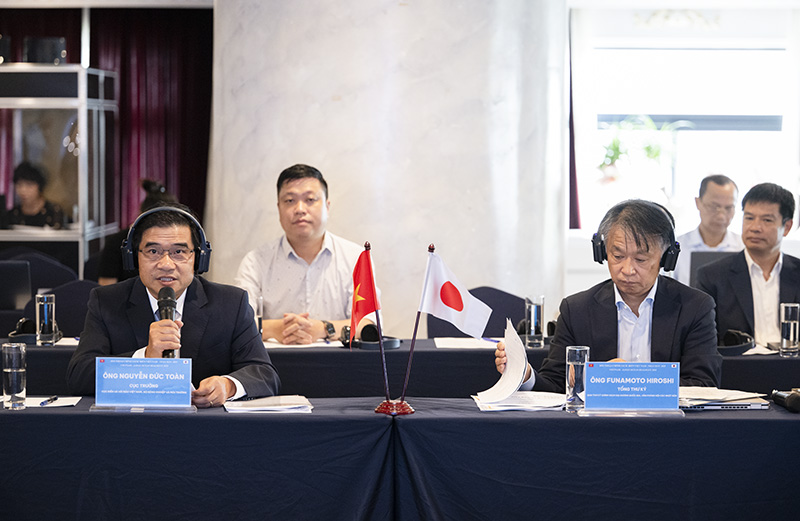
The 2025 Vietnam–Japan ocean policy dialogue strengthened bilateral cooperation and shaped a regional model for sustainable ocean governance
A prime example of such cooperation is the Lach Huyen Port project, where Japanese enterprises have participated in investment and operation. This is not only a critical infrastructure project but also a promising model for developing green ports, combining advanced technology, efficient governance, and public–private partnerships.
Looking ahead, Vietnam and Japan may expand cooperation into emerging fields such as digital technologies, artificial intelligence, marine data, and smart monitoring systems, to support evidence-based marine planning and governance. The synergy between Vietnam’s marine potential and Japan’s technology and expertise will serve as a vital driver for the green transition and sustainable ocean economy.
The Vietnam–Japan ocean policy dialogue 2025 not only reinforced the bilateral cooperation mechanism but also contributed to shaping a regional model for sustainable ocean governance. From practical experience to long-term vision, the two countries are working together to build a foundation for a safe, green, and prosperous ocean, making a tangible contribution to peace and development in the Asia–Pacific region.
Ngoc Huyen


